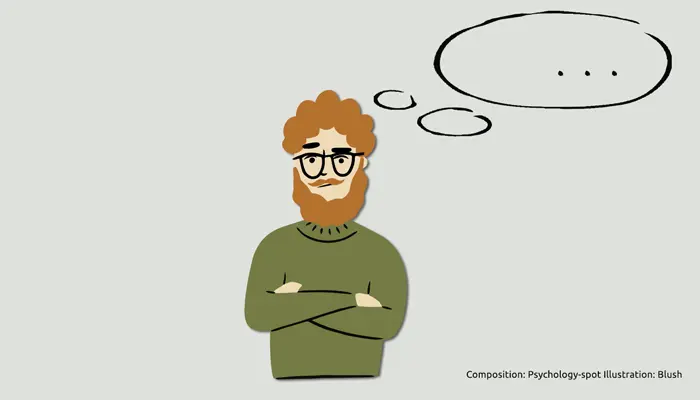
There are few things as annoying as an obsessive thought hammering our mind over and over again, invading the course of our mental activity. When that thought embarrasses us, makes us feel guilty, or is horrifiying us by the mere fact that it has crossed our minds, the problem takes on colossal proportions.
In fact, our mind can be our best ally or our worst enemy. Sometime, when we are on the ropes and uncertainty grips us, if we do not have the appropriate psychological tools, anxiety can completely overwhelm us. In those cases, obsessive and anxious thoughts can literally turn our lives into a nightmare.
What is thought-action fusion?
All kinds of thoughts pass through our minds every day, some are happy and others distressing. Generally we are able to filter the important thoughts at a given moment to pay attention to what is really meaningfull, but sometimes we do not achieve it and apparently inconsequential thoughts take over, displacing the rest, until they become an obsession. It is as if our mind takes on a life of its own and we cannot control it.
Thought-action fusion is precisely the tendency to believe that certain thoughts can come true. We believe that simply having thought about something increases the likelihood of that happening, as if thinking that a loved one will hurt himself could actually hurt him.
Usually that prospect is so terrifying and distressing that we try to put that thought out of our minds. But the more we try, the more it will strengthen because there is a rebound effect. Thus we end up giving that fleeting thought a disproportionate importance, to the point that it dominates our mental activity causing an inner debacle.
The types of thought-action fusion
1. Thought-action fusion probabilistic. It is the belief that simply having a thought about an event increases the probability that it will occur. We can believe, for example, that if we think of a car accident, it is more likely to occur, in which case it is a thought action-fusion with its own probability. But we can also believe that if we think about our brother being involved in a car accident, we are more likely to have one, which is called thought-action fusion with other probabilities.
2. Thought-action fusion moral. In this case, we believe that thinking about an action or behavior is morally equivalent to carrying out that behavior. For example, we believe that thinking that we could hit someone is just as morally wrong as actually hitting that person. Therefore, the very idea terrifies us and leads us to recriminate and blame ourselves, as if we had done it. In our mind, we do not separate thought from action.
The 4 traits that make us more likely to suffer from this cognitive distortion
The thought-action fusion phenomenon was discovered in people suffering from anxiety disorders and obsessive-compulsive disorder, so at first psychologists thought that it was limited to this area, but later they realized that We can all be victims of this cognitive distortion at some point in our life.
Even so, there are certain personality characteristics that make us more likely to suffer the thought-action fusion:
1. Hyperresponsibility. People who take too much responsibility for events and carry responsibilities that do not correspond to them, are often more likely to believe that their thoughts can materialize because they tend to blame themselves for everything that happens.
2. Obsession for control. People who need to get everything under control are also more likely to believe that their thoughts can become a threat, because they do not recognize that many of the things that actually happen do not depend on their will.
3. Tendency to worry. Those who tend to get lost in the maze of worries are also more likely to develop thought-action fusion since they are unable to stop their thoughts. On the contrary, they infuse them with psychological oxygen, so that they continue to grow and become more threatening and invasive.
4. Low tolerance to uncertainty. People who do not tolerate well uncertain situations have the tendency to anticipate events, generally falling into catastrophic thought patterns that end up generating great anxiety, to the point that they prevent them from differentiating thoughts from actions.
Thought-action fusion activates the feeling of threat and makes us feel tremendously guilty, causing us to fall into a loop of anxiety and anguish that considerably worsens our mood, as found by a study carried out at the University of Sussex.
How to stop thought-action fusion?
Above all, we must be aware that a thought, no matter how intense or terrible it may be, does not imply that what scares us so much is going to happen. Thoughts belong to the mental realm and their force to influence reality depends on our behaviors.
On the other hand, we must be aware that we can control our behaviors, but we have very little control over the thoughts that cross our mind, so we should not feel guilty for an unwanted thought.
Practicing trascendental meditation will help us get rid of the intrusive thoughts that bother us. The key is very simple: don’t hold on to them. If we do not give them importance, they will vanish in the same way that they appeared because our attention is what feeds them.
A simple visualization exercise can help us let go of those thoughts. We should relax and imagine that our thoughts are like clouds and our mind is the sky. Some of those clouds are white and fluffy, and even fun. Other clouds are black, big, and threatening. However, if we limit ourselves to being a mere outside viewer and don’t hold onto thoughts, they will end up passing by, just like clouds. We just have to set the mind free, making sure not to react emotionally.
Throughout the day our mind registers approximately 60,000 thoughts, so that if we do not hold on to some of them, sooner or later the thoughts that bother us will disappear giving way to others.
Sources:
Thompson, J. et. Al. (2013) Thought-action fusion across anxiety disorder diagnoses: Specificity and treatment effects. J Nerv Ment Dis; 201(5): 407–413.
Graham, C. L. et. Al. (2013) Aversive intrusive thoughts as contributors to inflated responsibility, intolerance of uncertainty, and thought-action fusion. Clinical Neuropsychiatry; 10 (3): 30-44.
Berle, D. & Starcevic, V. (2005) Thought–action fusion: Review of the literature and future directions. Clinical Psychology Review; 25(3): 263-284.
Shafran, R. & Rachman, S. (2004) Thought-action fusion: a review. J Behav Ther Exp Psychiatry; 35(2): 87-107.
Rachman, S. (1997) A cognitive theory of obsessions. Behav Res Ther; 35(9):793-802.



